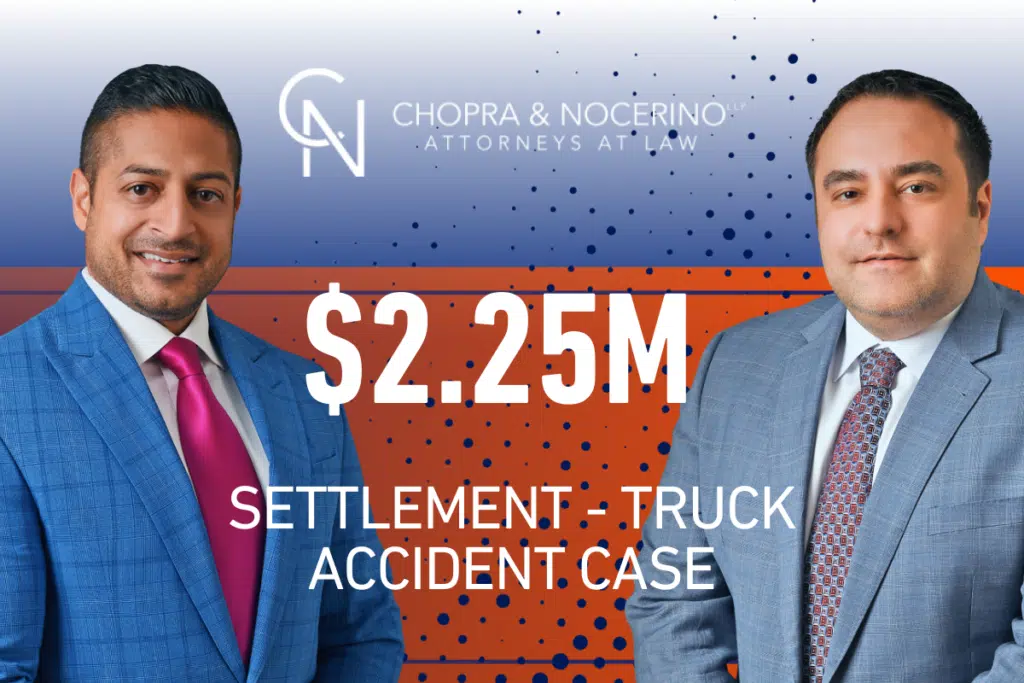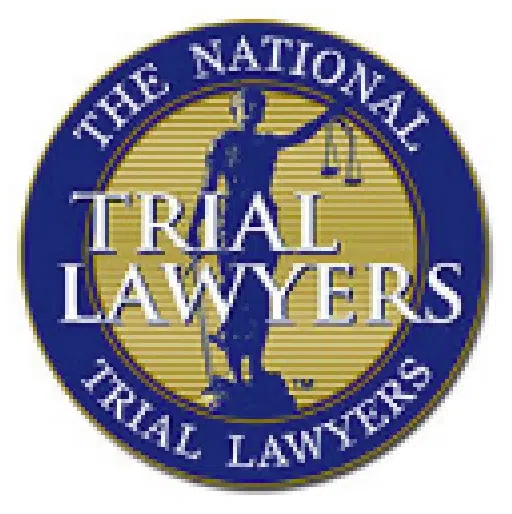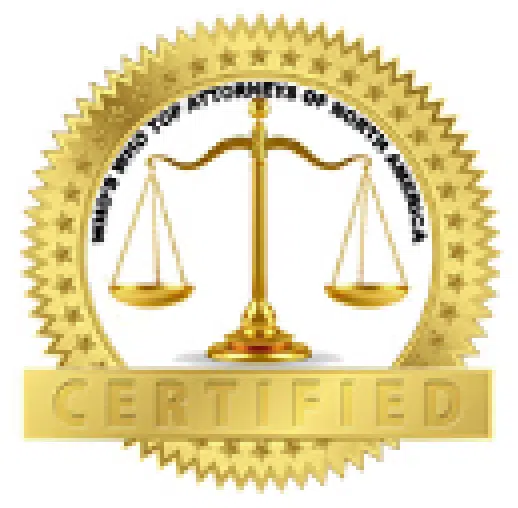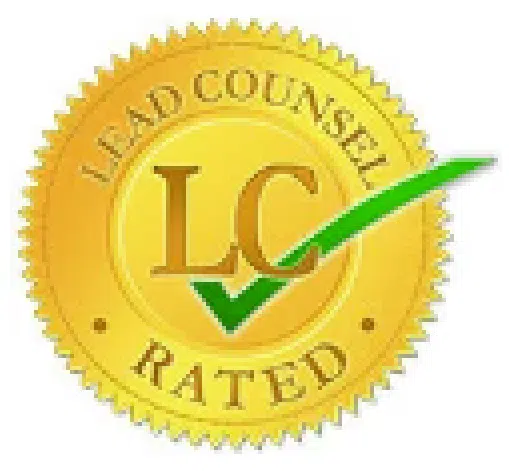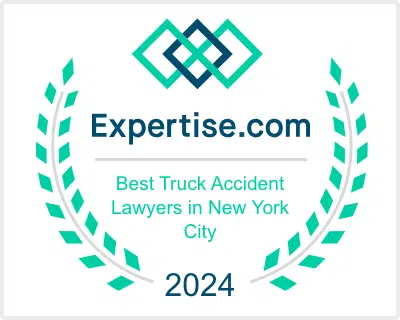New York Semi-Truck Accident Lawyer

Home » New York Truck Accident Lawyer
Legally Reviewed by:
Alex Nocerino

READ BIO
Alex Nocerino is a founding partner at our firm and a successful trial lawyer with roots in New York. He is a member of the New York State Bar Association, the New York State Trial Lawyers Association, and the American Association for Justice. He has helped injured individuals win hundreds of millions in compensation from large corporations, government entities, and wealthy landlords.
With 18 years of experience, he has been recognized as a Super Lawyer since 2019 and has a five-star Avvo rating. He is a true New Yorker and a successful trial lawyer who is unafraid to go up against even the powerful and combative defendants.
Content Last Updated: May 9, 2025
ON THIS PAGE
- FAQs About New York Truck Accidents
- What Can Our Truck Accident Lawyers Do to Help with Your Claim?
- How Chopra & Nocerino, LLP, Can Support You
- Who Can You Sue If You Were Injured in an Accident with a Semi Truck?
- How Much Money Can You Get in a Truck Accident Settlement?
- Common Causes of Truck Accidents in New York
- Truck Accident Injuries
- Commercial Truck Accident Laws in New York
- We Are Ready to Handle Your New York Truck Accident Lawsuit
If you or a loved one were injured in a commercial truck accident in New York, securing knowledgeable and experienced legal representation is crucial. Large truck accidents often involve multiple parties, intricate insurance policies, and complex liability issues. A skilled truck accident lawyer at Chopra & Nocerino, LLP, can guide you through the legal process and help you recover the compensation you deserve.
We are real New Yorkers and the exclusive personal injury law firm of the New York Mets, a team that knows all about strategy, skill, and overcoming challenges. Our New York truck accident lawyers strive to achieve excellent results at the negotiation table and in the courtroom. No matter the circumstances, our attorneys will stand by your side every step of the way. Visit our contact page to request your free consultation.
How Chopra & Nocerino, LLP, Can Support You With Your 18-Wheeler Accident Claim
Our legal team has what it takes to go to bat for you. If you’re seeking a highly-rated law firm that understands the intricacies of New York semi-truck accident cases and has a proven track record of winning, you want the all-star legal team at Chopra & Nocerino, LLP.
We have a strong track record of success, having recovered millions in verdicts and settlements for our clients. Here are a few of our notable truck accident wins:
- $19.5 million for a mid-aged woman that was involved in an accident with a commercial vehicle, who sustained a minor traumatic brain injury and had to undergo multiple surgeries.
- $10 million for a 77-year-old victim who sustained leg and neck injuries in a Brooklyn collision with a public bus.
- $2.25 million for a 33-year-old passenger in a vehicle struck by a truck, requiring a two-level disc replacement surgery.
- $1.5 million for a 45-year-old pedestrian struck by a truck in Brooklyn, requiring a single-level discectomy to his cervical spine and shoulder surgery.
- $1.475 million for a family struck by a fire truck that ran a red light, despite an “emergency doctrine” defense.
- $1.44 million for a 27-year-old victim rear-ended by a commercial vehicle in Suffolk County, New York.
- $1.2 million for a 33-year-old driver struck by a New York Department of Sanitation salt-spreading vehicle, despite allegations of intoxication.
At Chopra & Nocerino, LLP, there is no charge to have your case reviewed. During this session, we will address all your questions and concerns.
“Thank you so much for all the support and attention spent on my case! You guys are awesome. You did everything to help me with my accident case, and I am truly grateful for all your kindness and smartness on this deal. Glad with the result and all the attention I received! Recommended 100%.”
– Juliette M.
Who Can You Sue If You Were Injured in an Accident with a Semi Truck in New York?
When you’re involved in a truck accident in New York, the question of who to sue isn’t always straightforward. Unlike car accidents, where the driver is often the only at-fault party, truck accidents can involve multiple liable parties.
Determining Fault in a Commercial Truck Crash
The first step in any truck accident claim is determining who is at fault. Among others, liable parties could include the following:
- Truck driver for negligent driving.
- Trucking company for inadequate training or maintenance.
- Parts manufacturers and distributors for selling defective parts.
- Cargo loader for improper loading.
Sometimes, multiple parties share the blame, complicating the legal process further.
Suing Multiple Parties
When multiple parties are responsible for your damages, you can find yourself untangling a complex web of liability. Each party will likely have its own insurer and legal team, so hiring skilled semi-truck accident attorneys to protect your interests is crucial.
Comparative Negligence
New York is one of the few states that follows a “pure comparative negligence” rule. Under this rule, the court assigns each party a percentage of fault, totaling 100 percent. So long as you are not 100 percent liable for your accident, you can pursue compensation, which the court will reduce in proportion to your own liability.
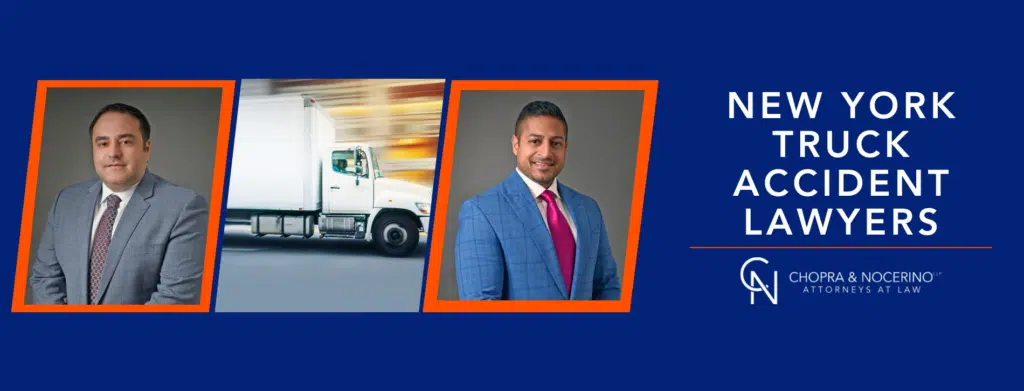
How Much Money Can You Get in a Truck Accident Settlement in New York?
Following a costly commercial truck accident, you may wonder about the value of your claim. The answer depends on the details of your case, so speaking to a knowledgeable truck accident lawyer is the best way to receive a good estimate. However, here are some guidelines that can give you an idea.
Types of Compensation for New York Semi-Truck Accidents
There are three main sources of compensation you can receive to cover your damages:
- Insurance payouts are generally the first line of financial recovery and can cover medical expenses, property damage, and more. However, insurance may be insufficient to compensate you for the total amount of your losses.
- Settlements are negotiated agreements in which the parties involved in a lawsuit determine how much money an injured victim will accept in exchange for foregoing the right to sue. Truck accident settlement agreements are often entered to avoid the time and cost of a full-fledged trial.
- Court-awarded damages in New York can include economic, non-economic, and punitive damages. Again, unlike many states, New York does not limit the damages you can receive in a personal injury claim.
Damage Awards
If you can’t reach a fair settlement with the liable parties, you may choose to take your case to court. The court will determine the value of your claim, as supported by the evidence your lawyer provides to substantiate your damages. These may include economic, non-economic, and punitive damages:
- Economic damages are fairly easy to quantify and typically include medical bills, lost wages, property damage, and lowered earning capacity. Your New York truck accident lawyer can verify these damages with receipts, billing records, and other documentation.
- Non-economic damages are more challenging to reduce to a monetary value. They may include pain and suffering, loss of enjoyment of life, and loss of consortium. While these damages are more difficult to quantify, they are just as important as your economic damages, if not more so.
- Punitive damages are ordered by courts to punish offending parties for particularly egregious behavior, as well as to send a message that such behavior will not be tolerated in the future. Courts rarely award punitive damages, but they can substantially raise the value of your claim when available.
Important Factors in Determining the Value of Your Case Involving a Commercial Vehicle
The value of your case depends on many factors. Our experienced attorneys are well-versed in New York truck accidents and can give you an idea of what your case may be worth. The most important determining factors are:
- Your damages – The more severe your injuries and financial losses, the higher your potential settlement.
- Your share of liability – Again, the court will assign you a percentage of liability for your accident, ranging from 0 to 100 percent. It will then reduce your compensation in proportion to your percentage of liability. For example, suppose the court decides that you were 20 percent responsible for your damages but finds them to be worth $1 million. In this scenario, your final award will be reduced to $800,000.
What Can Our Truck Accident Lawyers Do to Help with Your Claim?
Truck accidents involve large, heavy, commercial vehicles that often carry loads weighing many tons, as well as hazardous materials. These accidents can result in catastrophic injuries or even wrongful death. They frequently involve multiple parties, ranging from drivers and trucking companies to manufacturers and government entities.
If you were involved in a truck accident that involves complicated matters such as wrongful death or governmental liability, consulting with an experienced law firm can be invaluable. At Chopra & Nocerino, LLP, our team is made up of highly skilled and knowledgeable truck accident attorneys. We can help you navigate the complexities of multi-faceted legal issues, ensuring you get the representation you deserve.
A good New York truck accident lawyer will strive to help you secure compensation for your claim. But a great New York truck accident lawyer will get you the full and fair compensation you deserve while taking the workload, stress, and upfront financial investment entirely off your shoulders. Our unwavering support will allow you to focus on your recovery and your loved ones during this challenging time.
Here are a few ways our outstanding truck accident lawyers can become your MVPs:
1. The Opening Pitch: Initial Case Analysis
Just like a baseball game starts with an opening pitch, your legal journey will begin with an initial case analysis. This is where you meet your lawyer and tell them your story. They will scrutinize the details of your accident, provide an initial strength analysis of your claim, answer your questions, and estimate your potential compensation.
2. The Legal Bullpen: Gathering Evidence
Think of evidence gathering as a bullpen where you warm up for the big game. Your lawyer will carefully collect all necessary evidence, ranging from police reports and medical records to eyewitness and expert testimonies. They will use this evidence to strengthen your position.
3. Playing Hardball: Pre-Trial Negotiations
With solid evidence in hand, your lawyer will move to the negotiation table. They may need to play hardball with the at-fault parties, leveraging your evidence like a slugger aiming for the fences. The goal is to successfully negotiate your grand slam settlement.
4. Touching All the Bases: Administrative Filings
Navigating the legal system is like running the bases: you cannot afford to miss a single one. Your lawyer will ensure your bases are covered, from filing the initial claim to submitting court documents. Your New York truck accident attorney at Chopra & Nocerino, LLP, will strive to execute every administrative task with precision and timeliness.
5. The Final Inning: Courtroom Advocacy
If settlement negotiations are unsatisfactory, your lawyer will prepare to take your case into courtroom litigation. Armed with a strong lineup of evidence and testimony, your attorney will advocate for you with fierce and relentless determination.
Common Causes of Trucking Accidents in New York
Truck accidents can be caused by a wide range of factors. Understanding these factors is important for establishing liability and seeking compensation. Some common causes of truck accidents include:
- Driver fatigue
- Distracted driving
- Disregard of traffic laws
- Lack of training
- Unrealistic delivery schedules
- Defective truck parts
- Improperly loaded cargo
Determining the cause of a large truck accident is a complex process that requires thorough research and experience. The legal team at Chopra & Nocerino, LLP, has decades of experience identifying these causes and proving liability. Let us put that experience to work for you.
Common Truck Accident Injuries in New York
The sheer size and weight of many commercial trucks make them particularly dangerous when involved in accidents. They often cause catastrophic and sometimes fatal injuries. Immediate medical attention is critical to ensuring your well-being and fully documenting your injuries.
Remember that your medical treatment records will become crucial evidence when you file a lawsuit, so ensuring that they are complete is important. Common injuries in New York City truck accidents include:
- Traumatic brain injuries – A collision’s impact can cause the brain to strike against the inside of the skull, leading to cognitive and motor-function impairments.
- Spinal cord injuries – These can result in partial or complete paralysis, severely affecting mobility and quality of life.
- Broken bones and fractures – The force exerted during a collision can break and fracture bones, which may require extensive medical care and time to heal.
- Internal injuries – These are not always immediately apparent, but they can be life-threatening if not treated promptly.
- Whiplash – The force of an impact can cause a rapid back-and-forth movement of the neck, leading to serious damage and chronic pain. Whiplash often results from rear-end collisions.
- Burns – When truck accidents result in explosions, fire, or contact with hazardous substances, victims can suffer painful burn injuries.
- Post-traumatic stress disorder – The emotional trauma of experiencing a serious truck accident can cause long-term mental health struggles, such as recurring nightmares, anxiety, and depression.
Remember that the damages available after a serious semi-truck accident can cover much more than just your physical injuries. Emotional trauma, lost income, and diminished quality of life are also important yet sometimes overlooked consequences of accidents.
Commercial Truck Accident Laws in New York
Navigating the legal landscape after a truck accident in New York can be as complex as navigating the streets around Citi Field after a home game. That is why it is important to work with an attorney who understands New York’s relevant laws. Here are some important considerations:
1. Statute of Limitations
In New York, the statute of limitations for motor vehicle accidents is generally three years from the accident date. This is your legal filing deadline, and if you miss it, you’ll likely lose your right to compensation. There are a few exceptions to this rule, but sometimes, your deadline may be even shorter.
If your claim involves wrongful death, the deadline is generally two years from when your loved one passed away. Similarly, if the liable party is a government entity, your deadline may be only 90 days. This is just one of the many reasons it is so important to act quickly.
2. Minimum Auto Liability Insurance Coverage
In New York, the minimum auto liability insurance requirements for most folks are sometimes described as “25/50/10.” This refers to the required minimum coverage of:
- $10,000 for property damage for a single accident.
- $25,000 for bodily injury and $50,000 for death for a person involved in an accident.
- $50,000 for bodily injury and $100,000 for death for two or more people in an accident.
However, the liability coverage requirements set by state and federal laws are significantly higher for commercial trucks. Depending on the cargo they haul, truck drivers may be required to carry millions of dollars in auto liability insurance. This means truck accident injury victims have a larger pool of compensation to draw on.
3. Damage Caps
Unlike some states, New York generally does not cap damages in personal injury cases, including truck accidents. This means there is no upper limit on the compensation you can obtain for your injuries, pain, suffering, and more.
We Are Ready to Handle Your New York Truck Accident Lawsuit
Consulting with an experienced lawyer is the best way to deal with the complexities of your New York truck accident case. The team at Chopra & Nocerino, LLP, stands out for its no-nonsense attitude and unwavering commitment to our clients. When you work with us, we will tell it like it is and not sugarcoat the facts.
We’re real New Yorkers committed to serving our community by helping accident victims exercise their right to compensation. We are ready to fight for you. Contact us online to schedule your free, confidential consultation with a skilled New York truck accident attorney.
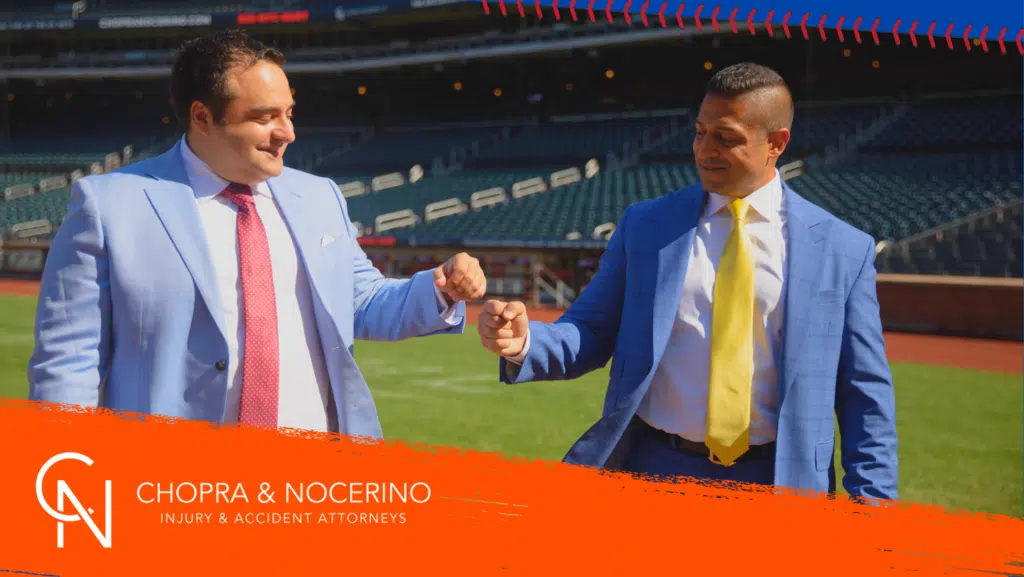
FAQs About New York Commercial Truck Accidents
1. How much does it cost to hire an attorney for a truck accident?
Chopra & Nocerino, LLP, operates on a contingency fee basis. This means you don’t pay anything unless you win your case. Our fee will be calculated as a pre-negotiated percentage of the amount we secure for you in compensation, meaning there are no surprises down the road. We also offer free consultations.
2. Can large commercial trucks drive through New York City?
Yes, but there are some restrictions. There is a New York City Truck Route Network, which is a set of roadways that commercial vehicles must use. These roadways are laid out in Section 4-13 of the New York City Traffic Rules.
3. Is there a time limit to file a truck accident injury claim?
Yes, this is set by a law known as the statute of limitations. Generally, the deadline is three years from the date of your accident, but certain factors could cut it down to as little as 90 days. Therefore, it is important to speak with a New York truck accident lawyer promptly after your accident to verify the correct filing deadline. If you miss it, your case will most likely be dismissed in court.
4. Are truck accidents common in New York?
While accidents with semi-trucks are not as common as car accidents, truck accidents do happen in New York City. This is in large part due to the city’s status as one of the densest urban areas in the country, as well as a major commercial hub. These factors contribute to a higher incidence of truck-related accidents compared to other areas. In 2021, there were over 3,700 large truck crashes in the state of New York. In total, 88 were fatal. In September 2023, New York City alone saw 584 accidents involving vehicles with six or more tires.
How Is Evidence Obtained?
Scene Investigation
- Visiting the accident site to document hazards, traffic signals, and road conditions.
- Taking photographs and videos of skid marks, debris, or any environmental factors.
Surveillance & Dashcam Footage
- Obtaining CCTV footage from nearby businesses, traffic cameras, or residential security systems.
- Using dashcam videos from vehicles involved in the accident or bystanders.
Event Data Recorder (EDR) or “Black Box” Data
- Extracting speed, braking, and acceleration data from vehicles involved.
- Helpful in disputing driver claims in high-speed or intersection accidents.
Cell Phone Records & Metadata
- Subpoenaing phone records to prove distracted driving (e.g., texting while driving).
- Analyzing GPS location history to track movement before the accident.


ON THIS PAGE
- How Chopra & Nocerino, LLP, Can Support You With Your 18-Wheeler Accident Claim
- Who Can You Sue If You Were Injured in an Accident with a Semi Truck?
- How Much Money Can You Get in a Truck Accident Settlement?
- What Can Our Truck Accident Lawyers Do to Help with Your Claim?
- Common Causes of Truck Accidents in New York
- Truck Accident Injuries
- Commercial Truck Accident Laws in New York
- We Are Ready to Handle Your New York Truck Accident Lawsuit
- FAQs About New York Truck Accidents
- New York Personal Injury Lawyer
- New York Bicycle Accident Lawyer
- New York City Bicycle Safety & Accident Resource
- New York Car Accident Lawyer
- New York Lyft Accident Lawyer
- New York Uber Accident Lawyer
- New York Motorcycle Accident Lawyer
- New York Truck Accident Lawyer
- New York Delivery Truck Accident Lawyer
- New York FedEx Accident Lawyer
- New York UPS Accident Lawyer
- New York Pedestrian Accident Lawyer
- New York City Bus Accident Lawyer Near You
- $10 MILLION
BUS ACCIDENT - $2.25 MILLION
BICYCLE ACCIDENT - $2.25 MILLION
TRUCK ACCIDENT - $1.05 MILLION
AUTO ACCIDENT
TESTIMONIALS
MEET THE ATTORNEYS
